I’m calling bullshit on the whole idea of talent
I can hear your objections already.
But…child prodigies!
I don’t know why some people are child prodigies and I don’t care. Child prodigies exist on one extreme end of a spectrum of what children are capable of doing. I wasn’t a child prodigy and hardly anyone else was either, so let’s move on.
But…neuroscience!
I know. I get it. You have a vague idea that Science Says that some people’s brains are just wired for music or painting or writing or dancing. You have definitely read this somewhere. Surely Georgia O’Keeffe’s brain was wired for color and abstraction. Surely Miles Davis’s brain was wired for jazz. Surely e.e. cummings’s brain was wired for groundbreaking free verse.
You know this because you have a nephew who can play anything. Just give him a musical instrument and a couple hours, and he’ll have it figured out. You have a neighbor who speaks five languages and can get by in a dozen more. You have a cousin who’s some kind of math genius, you don’t even understand it, but what she can do is really special.
And that’s because of their brains. It’s because of neuroscience. It has to be.
Because if it wasn’t their very special brains, where does that leave us?
It leaves us with the possibility that if someone carries out their craft with basic competence, it’s because they took classes and practiced. If they do it exceptionally well, it might be that they studied with some very good teachers and practiced with particular focus over a long period of time.
It leaves us with the possibility that any one of us could do some version of this ourselves.
Who invented talent?
I got curious about when we invented the word talent, and what it originally meant. When did we first come up this idea that talent was an inborn trait?
It turns out that the word ‘talent’ goes back to the Hebrews, Egyptians, Greeks, and Romans. It was a unit of measurement—specifically, a measurement of weight. Like a coin.
For example, a talent of gold might have been the equivalent of the value of one cow. There’s a parable of talent in the Bible, in which ‘talent’ refers to material possessions—to wealth, to things of value that you own.
OK, I can see a connection to our modern use of the word. But how did we go from seeing talent as a material good to seeing it as a skill?
That change seems to have happened in the fifteenth century, but maybe there’s a clue from ancient Greece, where another definition was applied to the word talent. Instead of a talent of gold being equal to the value of a cow, it was equal to the value of one person’s lifelong labor—which at that time was twenty years.
Wait. A talent equals twenty years of a person’s working life? A working life that was no doubt spent…apprenticing and practicing?
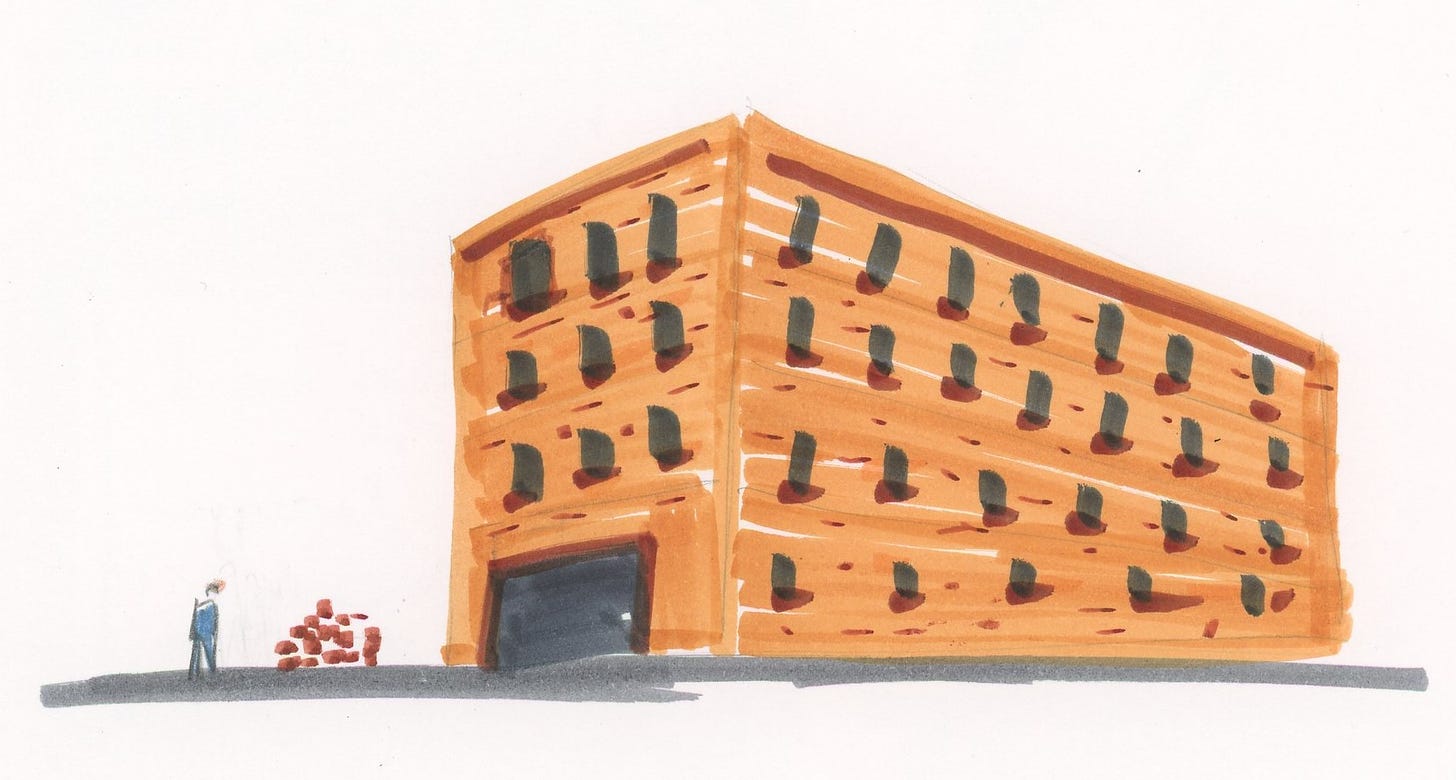
In that case, ‘talent’ wasn’t meant to be something you were born with at all. It was something that took you twenty years of effort to acquire. Quite literally, it meant the wages you earned over twenty years—but you might think of it as the accumulation of skill, too.
Ten Years Ago, at the Atlanta Botanical Garden…
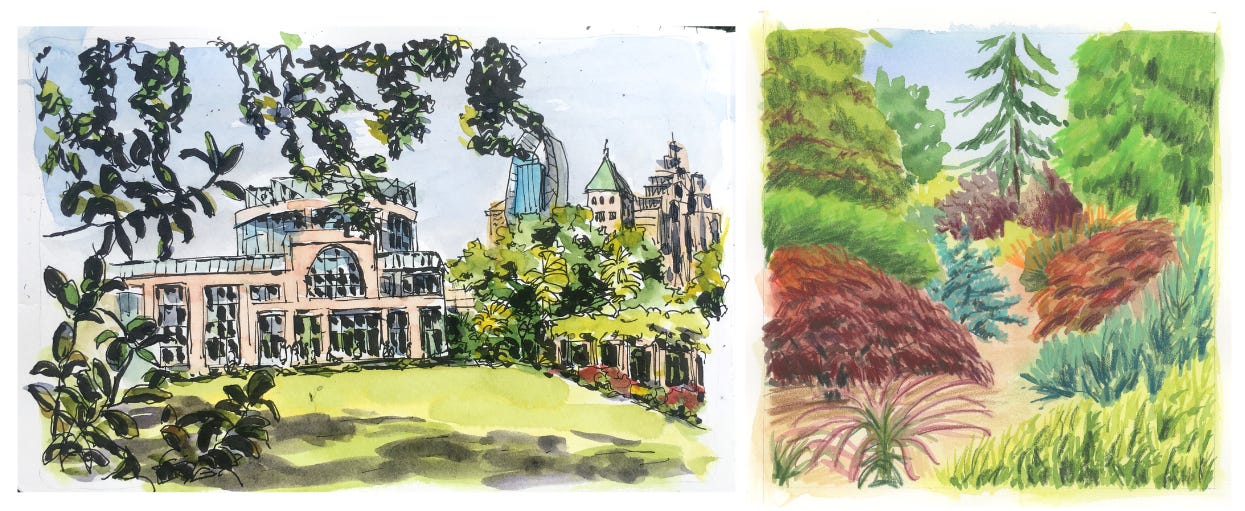
…I was sitting on a bench drawing pictures. A woman walked by and said, “Look at that! You’re so talented. I wish I could draw like that. I always wanted to.”
“You can,” I said. “All you have to do is take some drawing lessons. That’s what I did.”
“Oh, no,” she insisted. “I can’t. I don’t have the talent. My sister’s the artist.”
I laughed, but I wanted to cry. “You sound just like me. I used to say that. My brother’s the artist. My father’s the musician. Not me.”
She was having none of it. “Oh, but you should see my sister! She’s so good. I just can’t do what she does. So I became a psychologist.”
OK, there’s probably an entire life history in that sentence, but I knew she wouldn’t stick around long enough to unpack all that. Instead I said what I always do in these moments: “I didn’t know how to do any of this either. I learned how by taking classes.”
“Really?” she asked. Hesitant. Unsure. Not believing me. Starting to walk away.
“Really,” I said. “Hey. Your sister didn’t take art away from you.”
That stopped her. “You mean I have to stop blaming my sister for this?”
“Yes, you do.”
She tried on the line for size. “My sister didn’t take art away from me,” she said, wonderingly. “I’m going to tell my therapist you said that.”
I had to laugh. “You do that. Then sign up for an art class.”
There never was a Talent Fairy
We have this idea that there’s a thing called Talent, and that some people are born with it, and others are not, like blue eyes or curly hair.
If you have Talent, you can play an instrument or sing a song or paint a painting or write a book.
If you don’t have Talent, you can’t do any of those things. Need proof? Try it once, with no training or instruction, and show the world how you failed at it.
There. You’d like to do it, but you don’t have Talent. Your one failed attempt is proof of that.
Your sister has Talent. There was only that one Talent, and your parents had to decide which kid to give it to, so they gave it to your sister.
Or maybe nobody in your family has Talent. There. See? We don’t have it in our family. We looked all over for it, but we can’t find it. And if we did have it, we’d have to argue over which one of us gets to keep it, so it’s just as well we don’t have a single one.
So I’m here today to call bullshit on the very idea of Talent as an inborn trait, something that you either have or don’t have as a result of your birth.
The Talent Fairy did not pass you by. The truth is that the Talent Fairy was a figment of your imagination.
Now that she’s out of the way, go sign up for a class, and learn how to make something.
Supporters might be getting a little something from Venice this week
I’m writing this ahead of a trip to Venice, where I very much hope to do a lot of drawing and a little filming, in which case I’ll send out a little travel sketching demo to those of you who chip in a few bucks a month to keep this enterprise afloat. Here’s a drawing I made before I left. Will I pull off something like this when I’m in Venice? You’ll have to subscribe to find out.
Anyway, if there’s something you’d like to do in a sketchbook, we’re probably doing it. These video lessons go out once a week, and you get access to a whole archive right here, plus we do live Zooms from time to time and take on group projects and other stuff. Join us!
The Bit at the End
Order signed copies of my new book, The Tree Collectors, from Broadway Books here in Portland.
Come find me on Instagram, or see paintings for sale- Right here
Order signed copies of some of my books from my husband’s bookstore, or order my books and many books I love at Bookshop.org
Take one of my online writing or art classes here
Leave a comment! I love hearing from you!

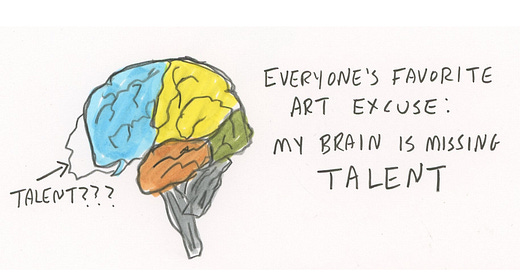


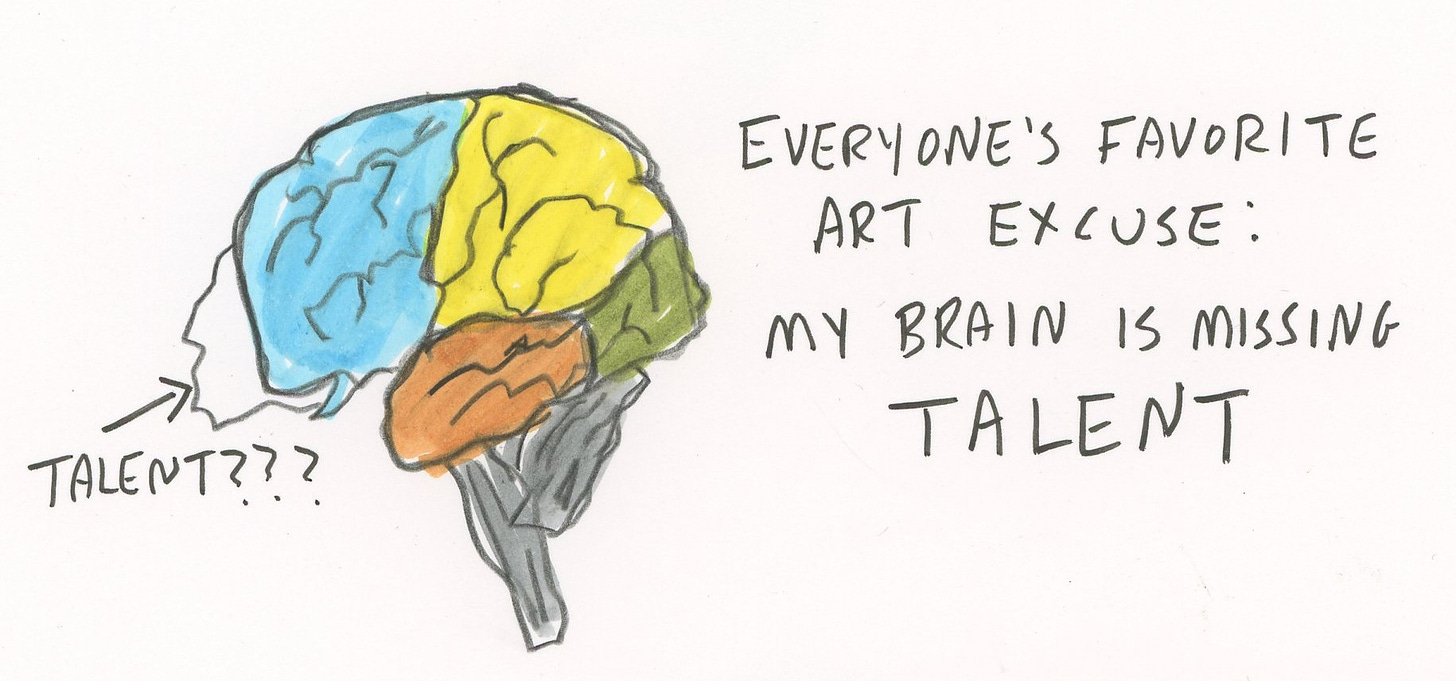
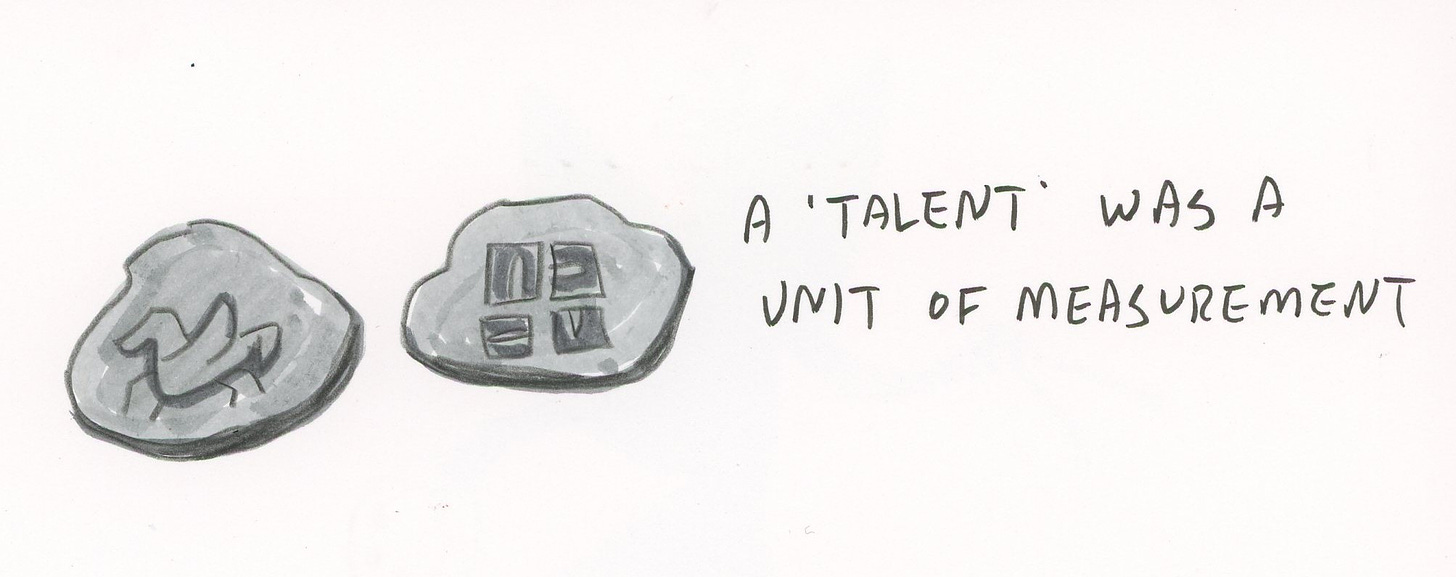
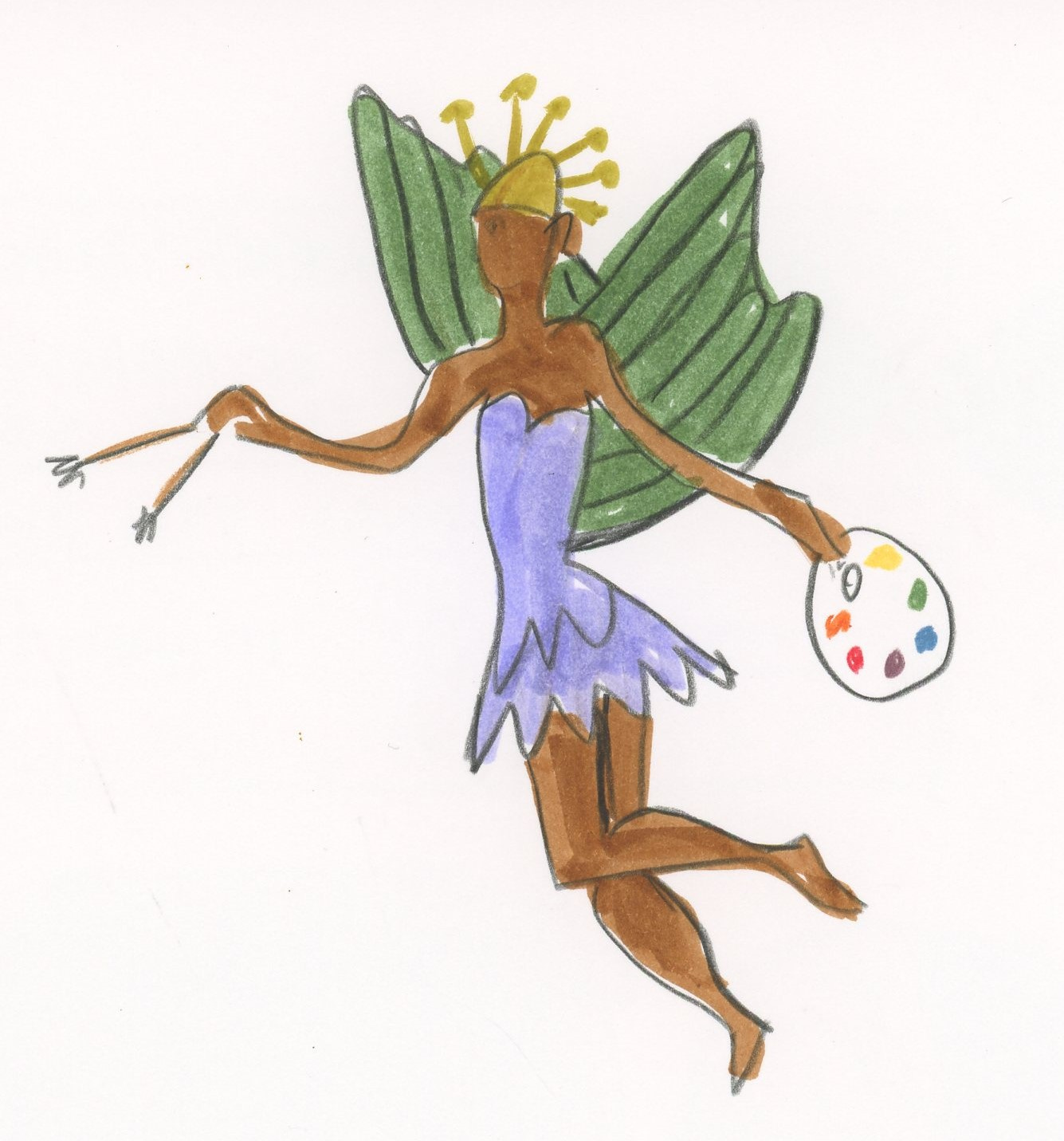
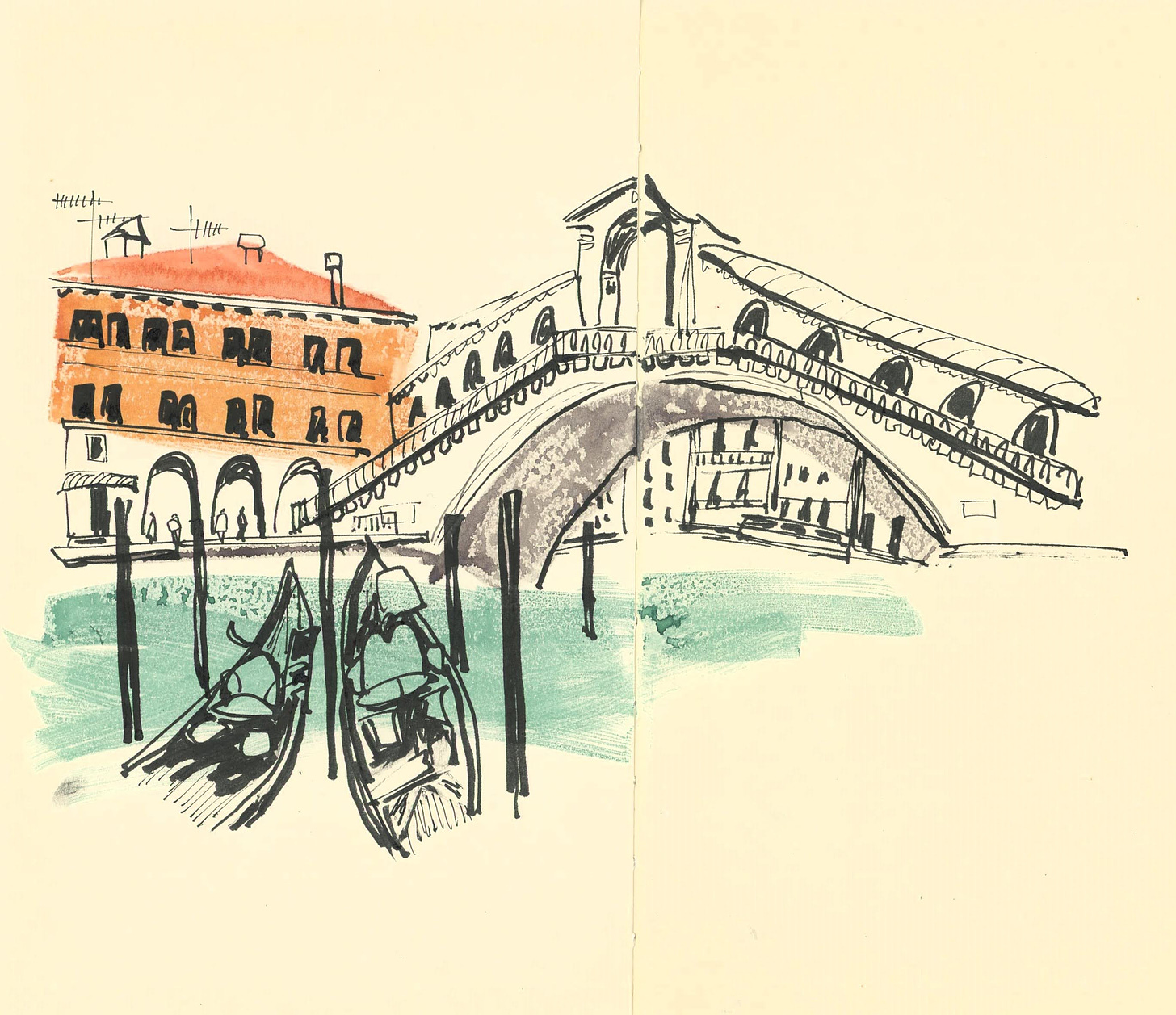
Thank you for writing this. I feel so validated! I am an accomplished knitter, but only because I've knit seriously for twenty years. When I knit in public, it never fails that someone tells me that I'm so talented, and they could never do what I do. And nobody will ever accept that it's not magic-- it's the willingness to sit with my knitting needles for a couple of hours a day, getting through the tedium until it becomes muscle memory and then looking for patterns that will be fun because they are a challenge. Literally anybody could do what I do, if they put in the work.
My favorite line when someone says, “You’re so talented” is to say, “It took a lot of time and practice to get this talented.”